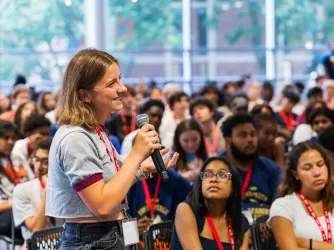Table of Contents
Intercollegiate Debate Organization Discourages Debate

Free speech advocates know that open debate serves many purposes. Participants may not only persuade others of their viewpoint or be persuaded themselves, but also strengthen their communicative and analytical skills. So one would expect a collegiate debate association to appreciate that sometimes, in the course of a debate, things are said that may leave people uncomfortable or even highly offended. Unfortunately, the American Parliamentary Debate Association (APDA) is sending its debaters mixed messages about tip-toeing around competitors’ feelings at the expense of a rigorous discussion.
APDA is a student-run organization that organizes dozens of tournaments and a national championship every year, which involve hundreds of teams across the country competing to demonstrate “rigorous argumentation, logical analysis, quick thinking, breadth of knowledge, and rhetorical ability over preparation of evidence.” In 2000, in order to “provide a harassment-free environment,” the APDA established its Equal Opportunity Facilitators program; EOFs would “resolve issues of harassment as they are brought to the attention of the EOF.”
FIRE of course agrees that no student debater should be subjected to actual harassment. But recent documents posted on the EOF program’s Facebook page go much further than prohibiting harassment—they are bound to leave debaters unable or unwilling to tackle some of the most important political issues of the day. The guidelines set forth by APDA students don’t create any constitutional issues. The ADPA is a private organization and has the First Amendment freedom of association right to promulgate rules as they see fit. But the guidelines are nevertheless a stunning example of a troubling trend: students demanding freedom from speech rather than freedom of speech, and institutions that should know better acquiescing to those demands.
The EOF “Guide to Equity 2015–2016,” for example, explains that APDA members may have had personal experiences relating to the “sensitive/important/tough issues” covered in debates. Accordingly, “honest questions are good, but antagonistic arguing for the sake of arguing is bad/not preferred. You can all feel the difference between asking a real question and trying to start a fight for fun.”
But isn’t playing devil’s advocate—arguing for the sake of arguing—exactly what formal debate is all about?
The guide goes on to clarify, though the details aren’t reassuring in the slightest. “How do I know what is/is not an equity violations [sic]?” the guide asks. It answers (emphasis added):
If you would feel comfortable saying these remarks in front of a crowd filled with the people about which you are speaking, then your speech is most likely equitable. For example, if you are talking about Indigenous People, imagine that you are speaking to a group of Indigenous People.
Would your speech offend them? If the answer is maybe, you shouldn’t say it.
Lots of people would be offended facing harsh opinions or even objective truths about themselves or the groups they are part of. That doesn’t change the fact that these points are often critical to honest conversations—or debates—about important topics. It’s disheartening, to say the least, to see students being told to err heavily on the side of self-censorship.
Unsurprisingly, “triggering examples” and “micro-aggressions” pose a particular problem for the EOFs. They provide a separate document entitled “A Short Guide to Trigger Warnings: Suggestions and Advice for Debating Sensitive Topics”—which of course includes its own trigger warning, apparently for those who didn’t read the title directly above it:
*Trigger Warning: This document contains information on specific triggers and the results of being triggered*
This guide insists that trigger warnings are “not a way to censor sensitive material” (emphasis in original). It also, however, directs debaters to “speak privately” with each opponent and the judge before addressing any “potentially distressing material” and “politely run a different case” if anyone is uncomfortable. The guide’s examples of triggering topics include sexual and other violence, mental illness, and “[h]arsh discrimination faced by unprivileged groups.”
The EOFs seem to acknowledge the potential for debate to be hindered, but move forward nonetheless:
I’m still unconvinced, shouldn’t we be talking about these topics if they are such a pressing issue?
Absolutely. However, talking about issues, such as sexual assault, that are about stopping violence are not valuable if they reharm individuals who have faced trauma outside of a debate round. The only thing you can gain from running an untrigger warned case against a team that would have rejected the topic is a bad debate round, which no one wants.
In other words, all the potential benefits that open discussions provide—bringing attention to problems, finding solutions, and potentially saving people in the future from suffering physical and emotional harm—do not, for the EOFs, outweigh the emotional comfort of a participant or member of the audience. Nevermind the fact that each participant voluntarily opted to debate in a program that prides itself on “forc[ing students] to debate almost any topic at short notice.”
And the mixed messages just keep on coming. The Guide to Equity advises debaters that “you should never refuse to engage with a topic or noticeably look down upon it because it is outside of your comfort zone.” This message is apparently directed at members of privileged majority groups who may wish to avoid topics relevant to marginalized groups, but its justification rings true for any restriction on topics: Among other problems, avoiding topics because of discomfort “decreases your ability to learn and grow as a debater.” It would seem that if you are a member of what might be viewed as a marginalized group, you have a right not to have your feelings hurt; if you aren’t, then you don’t.
APDA’s rules posted on its website also advise students on “points of personal privilege,” by which competitors can voice objections to an “extremely offensive” statement made by a speaker, during any point in his or her speech before the last minute. According to the APDA, points of personal privilege “are almost never used” but can be raised if a student has “been deeply insulted on a personal level by an intentional attack on [his or her] person.” But why are they almost never used? Apparently someone in APDA, at least, acknowledges that debate shouldn’t be hindered because of one participant’s subjective response to a discussion regardless of whether it was relevant to the matter at hand.
The Guide to Equity goes on to describe how to file a complaint and explains that an Equity Officer (whose duties overlap with, but are not quite the same as, an Equal Opportunity Facilitator) can take actions ranging from a verbal warning to banning an individual from the tournament. Not to worry, though—“most of the time, as long as you respond in good faith, make a genuine effort to understand, and apologize, the complaint will be resolved.” That is to say: As long as you promptly yield to the feelings of whoever doesn’t like what you said, you won’t be punished. How generous of them.
All in all, it’s doubtful that student debaters reading these guides, and contemplating how they will debate while conforming their arguments to the wishes of other other side and two separate “equity” authorities, will feel free to argue as zealously and frankly as they otherwise might. FIRE doesn’t like to see students discouraged from speaking their minds on campus generally, but it is particularly worrying to see this kind of discouragement from precisely those who should understand the value of robust debate.
Recent Articles
FIRE’s award-winning Newsdesk covers the free speech news you need to stay informed.

FIRE’s defense of pollster J. Ann Selzer against Donald Trump’s lawsuit is First Amendment 101

Cosmetologists can’t shoot a gun? FIRE ‘blasts’ tech college for punishing student over target practice video

China’s censorship goes global — from secret police stations to video games
